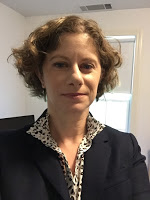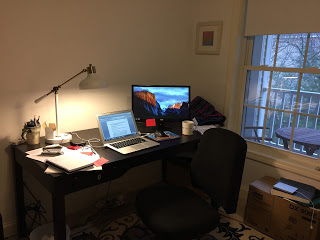I am Marie Morganelli, and This is How I Work
 Today, I am hosting Marie Morganelli in the “How I Work” series. Marie Morganelli has an earned doctorate in English Literature. She has taught literature and composition at the community college and university levels since 2006, and has professional experience in marketing, copywriting, and volunteer management, as well as visitor services for a large cultural institution. She is passionate about informal education, particularly with zoos and other cultural institutions, and with telling a good story. Her freelance business, www.precisewords.org, focuses on clear, concise copywriting for small businesses, nonprofit organizations, and other publications who need help telling their unique story to further their goals. She is a huge fan of travel, coffee, and wine.
Today, I am hosting Marie Morganelli in the “How I Work” series. Marie Morganelli has an earned doctorate in English Literature. She has taught literature and composition at the community college and university levels since 2006, and has professional experience in marketing, copywriting, and volunteer management, as well as visitor services for a large cultural institution. She is passionate about informal education, particularly with zoos and other cultural institutions, and with telling a good story. Her freelance business, www.precisewords.org, focuses on clear, concise copywriting for small businesses, nonprofit organizations, and other publications who need help telling their unique story to further their goals. She is a huge fan of travel, coffee, and wine.
General: Marie Morganelli has a PhD in English literature, and is building a freelance copywriting business while working by day as an administrator for a university with a large online presence.
Current Job: Freelance writer for Precise Words Copywriting
Current Location: Manchester, NH
Current mobile device: An apple iphone 6, with which I have a love/hate relationship
Current computer: MacBook Air 13 in.
Can you briefly explain your current situation and research to us?
I finished my PhD with no interest whatsoever in working in an academic field. I was burned out from the politics of graduate school, and stressed by the many hoops one has to jump through to get anywhere with a career in academia. I do love teaching, though, and so taught part-time for an online university while working full time in education and guest services at a cultural institution (zoo). The part-time job led to a full time job as an Associate Dean, so, ironically, I did find myself working in an academic field, though because our program is unique, my traditional title does not quite match my somewhat nontraditional role. Our hierarchy and program management are somewhat different than at a traditional university, which is what drew me to it.
While I feel very lucky to have this position, I missed working in a creative capacity, and have an entrepreneurial spirit, and so I have been working on building a freelance business to indulge my creative interests, utilize my skills, and feel as though I have some agency as to my personal success.
What tools, apps and software are essential to your workflow?
My MacBook Air is one of my favorite purchases ever. I bought it when I started teaching online because it is so lightweight and portable. I previously had a Windows-based laptop which was heavier and thus harder to lug through airports, and it was prone to crashing from viruses. Macs cost a lot more but crash a lot less, and the MacBook line is incredibly lightweight. I opted for the 13 in. because the bit of extra screen space is helpful. The 11 in. was just too small to be practical for me.
I prefer a laptop to iPad because I like having my files with me as well as the full size keyboard.
As for apps and software, I use Microsoft Word almost exclusively to write, though I do sit down with a notepad and pen quite often and rock it old school when writing a first draft. The pen in my hand helps me think better, I find. That also prevents me from web-surfing when I should be working!
I don’t use many apps in the course of getting my work done, though I do use the internet at large quite a bit for research.
What does your workspace setup look like?
I have a desk, chosen specifically for its large surface so I could spread out, in my spare bedroom. I have a second monitor that is incredibly helpful. Sometimes, when the weather is nice, I take my laptop outside and work on my porch.
I currently sit in a traditional office chair, and it’s killing my back. I am on the lookout for a backless kneeling chair to help with posture.
What is your best advice for productive academic work?
I do try to stay current in research and academic writing given my day job, but the truth is, I do not love it. I much prefer to work on my freelance projects or personal writing when it comes to professional writing. There is something about academic writing that has never truly appealed to me.
How do you keep an overview of projects and tasks?
I am continuously working on ways to do this better. Right now, my billing is tracked through an excel spreadsheet and I use the calendar built in on my mac, so I can sync with my phone. I tried using a paper calendar, but online seems to work better. I am determined to find a better way, though!
Besides phone and computer, do you use other technological tools in work and daily life?
These are the key items. I wish I could get by with using technology less, and I have been making a conscious effort to stare at my phone less overall, which helps. The truth is that I type much faster than I handwrite, so working via computer will probably always be necessary.
Which skill makes you stand out as an academic?
I’m a pretty terrible academic, to be honest! I am a terrific teacher, though, and an excellent writer. I have the skills to be a good academic but not the spirit. The skills and confidence I learned in graduate school, though, directly influence the work that I do now, both as a freelance writer and as an administrator, and I am not sure I would be on my current path without having gone through that experience. I do have a pretty strong dose of self-confidence when it comes to knowing that I’m good enough and smart enough for the work that I’m doing.
What do you listen to when you work?
Usually, silence or the birds chirping outside, which make me happy because it means that spring is finally, finally here. Sometimes I listen to classical music.
What are you currently reading? How do you find time for reading?
One of my current goals is to read more. Reading is one of my favorite things to do, and so I decided to make time for it. I read for at least half an hour every night before bed (with a hard copy book or my non-backlit Kindle) in addition to any other reading I can squeeze into a day. I am currently halfway through “Pachinko” by Min Jin Lee, which I highly recommend. It’s riveting.
I also read business-related books, and right now am reading “Blue Ocean Shift” by W. Chan Kim and Renee Mauborgne, which is about changing one’s perspective from being a competitor to being an innovator. After that, I plan to dive into “Change Your Space, Change Your Culture” by Rex Miller, Mabel Casey, and Mark Konchar, because the concept of space and place is one that interests me a great deal and that affects many aspects of our personal and professional lives (and was a focus in my dissertation).
Are you more of an introvert or extrovert? How does this influence your working habits?
I am an introvert through and through. It took a long time for me to realize this. I spent years not really understanding how I could not consider myself shy yet found myself wanting to spend so much time alone. Then I started learning more about introverts and recognized myself immediately. I do work to embrace and appreciate myself for who I am, and know that sometimes I need time to myself, and I protect and defend that time. But I also recognize that sometimes a person needs to act like an extrovert to get things done. My previous role at the zoo managing guest services taught me how to function like an extrovert when needed.
Being a writer really is the perfect job for an introvert, except I do think it’s important not to let my comfort level at spending time alone become a crutch or a habit. Instead, I make time to participate in activities outside my home because “introvert” does not have to mean “hermit!” Plus, personal connections are how one grows and nurtures a business as well as are an important way to stay connected with others.
What’s your sleep routine like?
I really wish I could confidently say that I get eight to nine hours of sleep a night every night, but that would be a lie. I am working towards meeting my goal of eight hours of sleep a night but I have yet to meet that goal, except on weekends. Typically, I try to at least get ready for bed by 9pm, and then read for a bit. I wake up around 5am to work on my freelance projects for a few hours before going in to work at my full time position.
What’s your work routine like?
I work best in the early mornings, especially with a deadline, such as a time I need to leave to get to my full time position. I do not work well at all in the evenings when I am tired, so I reserve evenings for meal preparation, exercise, reading, and my artistic hobbies (cross-stitching, drawing, and stained glass).
What’s the best advice you ever received?
Years ago, I asked my dad what advice he would go back and give his younger self if he could only give himself one piece of advice. He thought about it for a moment and then said: “Save early, save often.”
He was right. The impact of compounding interest is real. The impact of getting into a habit of saving regularly is real. Thanks to that one piece of advice, I opened my first retirement account when I was still in college, before I even had my first full time job, and I am definitely seeing the rewards of that now. This advice translates into other aspects of life as well, because making a habit to move consistently forward, one step after one step after one step, is how to accomplish one’s goals and make dreams a reality.

